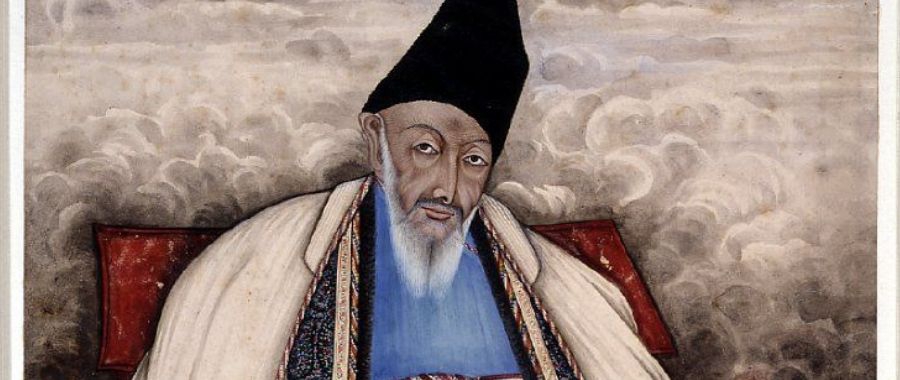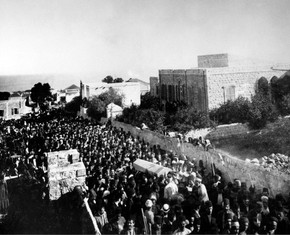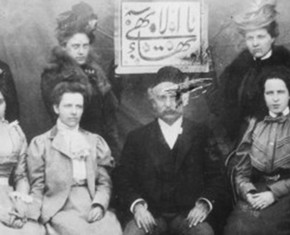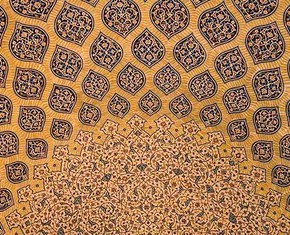The views expressed in our content reflect individual perspectives and do not represent the authoritative views of the Baha'i Faith.
In 1848 Muhammad Shah, the 39-year old king of Persia, was dying.
According to Shiite Islam, Persia’s supreme monarch ruled as a divine surrogate – until the coming of the Promised One, who Muslims knew as the Qa’im.
Therefore, the shah – the Persian word for “king” – possessed absolute power with no civil tribunal to check his arbitrary rule, including the power of life and death over everyone he ruled.
However, Muhammad Shah personified less the stereotype of the dictatorial tyrant than he did the archetype of the Fisher King — the Wounded King. In that myth, the disabled king, too sick to rule, awaits the arrival of an unknown nobleman possessing the powers to heal him.
Such was the scene in Persia in the late 1840’s when Muhammad Shah heard reports of a young holy man rumored to have healing powers. He soon sent a mounted royal convoy to escort the Bab – a title meaning “the Gate” – into his royal presence.
A dabbler in pseudo-mystic ideas, Muhammad Shah had elevated his childhood tutor to the status of an oracle, to whom he not only deferred governance as Grand Vizier, but also gave the reverence due a demigod. Haji Mirza Aqasi, by cunningly taking on the pseudo-pious title of Haji (or “pilgrim”) had exploited his young charge’s curiosity in all things otherworldly. Through magical tricks and dream interpretations, the ambitious tutor had achieved mastery over the future shah and made his being named Grand Vizier a historical inevitability.
However, as royal premier, the self-described miracle-worker had not proven capable of curing Muhammad Shah’s incapacitating gout. So fearing the loss of his primacy as royal advisor, the Haji prevented the Shah from meeting The Bab. Instead, he banished the Bab to a remote dungeon. Imprisoned in the mountain fastness of the Castle of Mah-Ku, The Bab wrote to Muhammad Shah about his conniving Vizier:
By the One in Whose hand is my soul, he has cast no one but himself into prison. Dost thou imagine him whom thou hast appointed Chancellor in thy kingdom to be the best leader and the best supporter? Nay, I swear by thy Lord. He will bring thee into grievous trouble by reason of that which Satan instilleth in his heart, and verily, he himself is Satan. – Selections from the Writings of the Bab, p. 25.
Haji Mirza Aqasi’s machinations are vividly portrayed in my recently published historical novel, Persian Passion, which depicts why Shoghi Effendi referred to Muhammad Shah’s Vizier as an “evil genius.” – God Passes By, p. 82.
The new book dramatizes precisely how Muhammad Shah’s Grand Vizier earned his designation as “Anti-Christ of the Babi Revelation,” and why his diabolical careerism did not even rule out his persecution of a prophet of God.
Abbas Mirza, the father of Muhammad Shah, had been the true heir to the Peacock Throne; however, his premature death had led to his son’s accession. Abbas Mirza, along with his advisor, the Qa’im Maqam, had been two of the most remarkable men of 19th Century Persia. Realizing the world was passing by Shi’ite-constrained Persia, Abbas Mirza had sent the first Persian students to Europe to learn how to modernize their native country. On his deathbed, still concerned about the fate of his homeland, Abbas Mirza asked his son, soon to ascend to the throne as Muhammad Shah, to name the Qa’im Maqam as his Grand Vizier.
Abbas Mirza also asked Muhammad Shah to promise never to “spill the blood” of the Qa’im Maqam, well aware that his son had blinded two of his own brothers to prevent their vying with him for the throne.
Whispering, as always, in the ear of his former student, the fiendish Haji suggested to the new king how he could get out of his two promises to his father without breaking his word. Haji Mirza Aqasi recommended that they bloodlessly strangle to death the Qa’im Maqam. The dastardly deed was arranged, about which Baha’u’llah wrote:
His Majesty Muhammad Shah, despite the excellence of his rank, committed two heinous deeds. One was the order to banish the Lord of the Realms of Grace and Bounty, the [Bab]; and the other, the murder of the Prince of the City of Statesmanship and Literary Accomplishment [the Qa’im Maqam]. – Tablets of Baha’u’llah, p. 65.
Having extinguished “the light of the age,” the Haji then replaced the Qa’im Maqam as Muhammad Shah’s Grand Vizier. However, his profligate and licentious lifestyle soon bankrupted the royal treasury. Meanwhile, his ruinous policies brought Persia to the brink of revolution.
Ironically, the Haji had always shown great affection for Baha’u’llah. The Vizier had long sought to take the young Baha’u’llah under his wing as protégé – despite the fact that the Haji had financially ruined Baha’u’llah’s father, Mirza Buzurg. Upon hearing that Mirza Buzurg had made reference to his voracious sexual appetite, the Haji stripped the minister of his governorship of the provinces of Burujird and Luristan. He also canceled the deposed minister’s annual government allowance, and then seized his ancestral home. As postscript, the Haji then summoned the young Baha’u’llah to his presence and complained, as if expecting the son to take sides against his father: “What shall I do? What can I do? He is your father. For your sake I will try to forget this and let bygones be bygones.”
Still attempting to co-opt the young Baha’u’llah, the Haji soon offered him a government post, which Baha’u’llah politely turned down. But by neither kowtowing to nor groveling before the Grand Vizier, Baha’u’llah had somehow undermined the Haji’s own exalted sense of himself. Like most false mentors who have their own, rather than their wards’ interests in mind, the Haji could not abide being dispensable; he could not endure not being adored.
Finally, in August of 1848 the Haji convinced Muhammad Shah to issue a death sentence for Baha’u’llah. Thus, that vile Vizier incurred the unique iniquitous distinction of having ordered the execution of two messengers of God – the Bab and Baha’u’llah. As the imperial death decree was published, the Bab’s “Sermon of Wrath” arrived, addressing the Haji as: “O thou who hast disbelieved in God and hast turned thy face away from His signs!” At the same time, a final tablet from the Bab to Muhammad Shah also arrived, making mention of the depraved Vizier:
Hadst thou not appointed him as thy Chancellor, no one would have paid him the slightest attention. Ere long thou shalt pass away and shalt declare thyself clear of the devil whom thou hast appointed as thy Chancellor, saying: ‘O would that I had not taken the devil as my Chancellor, nor appointed an imposter as my guide and adviser… – Selections from the Writings of the Bab, p. 26.
Less than a month later, Muhammad Shah died. Every royal decree issued in his name immediately became a dead letter. Baha’u’llah was safe. Less than a year later, the Haji was dead, as well.
The rest is history. Despite the murderous machinations of the “flock of idle, parasitical princelings and governors, corrupt, incompetent, tenaciously holding to their ill-gotten privileges, and utterly subservient to a notoriously degraded clerical order,” the heroic tales in the Dawn-Breakers remind us to see the selfless spiritual acts of the noble followers of the Bab and Baha’u’llah as a mighty source of inspiration. After all, that divine message is the light our current darkened society so desperately could use to see its way forward.
















Comments
Sign in or create an account
Continue with Googleor